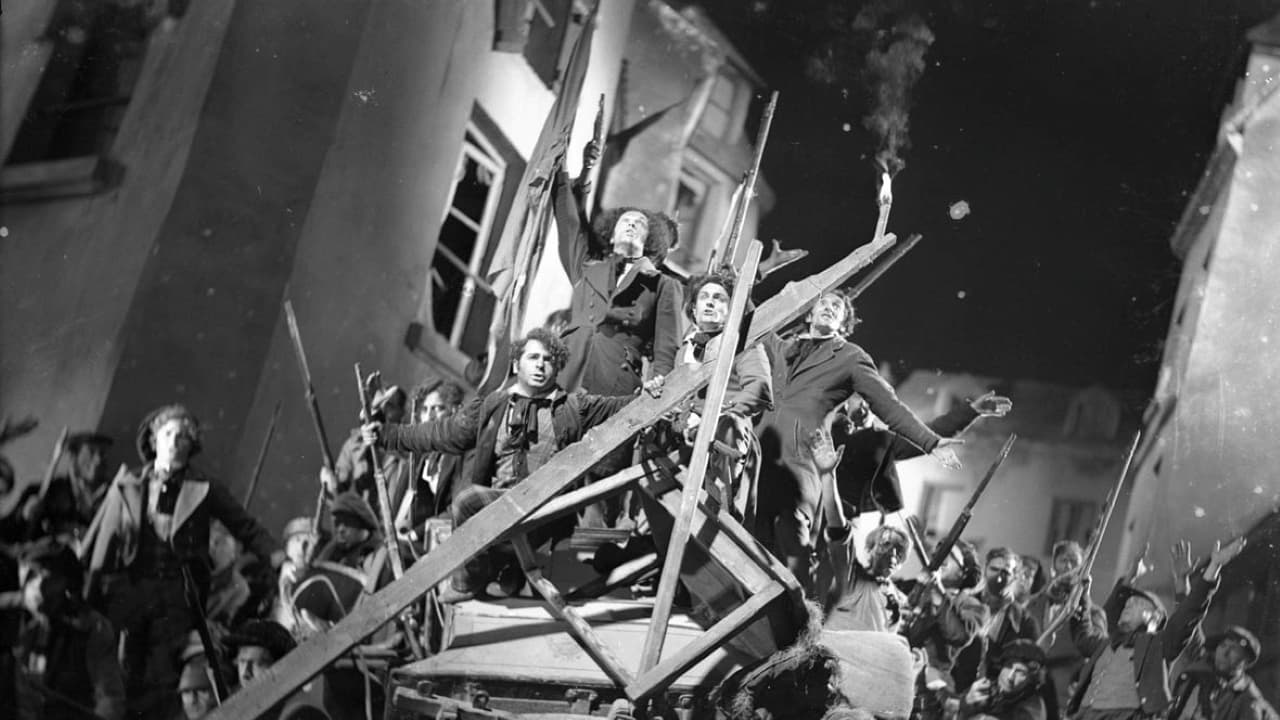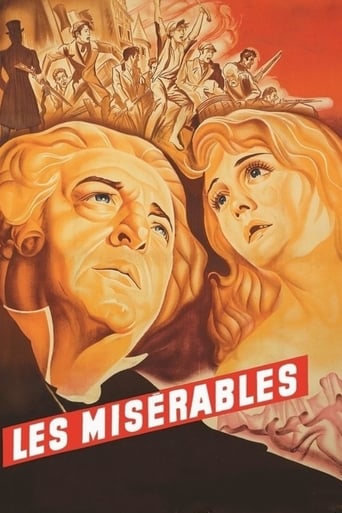

If they made any more versions of this famous Victor Hugo tale I think I'd go mad and rush around the streets spouting French gibberish and tearing everything apart in a frantic search for cider apples or a loaf of bread. It's all reminiscent of Charles Dickens in that it's a sketch -- a long sketch -- of what can happen to you when you don't have enough money for fundamental things.Well, briefly, Jean Valjean (Baur) is a convict released after 19 years in prison for stealing bread and trying to escape. He's a real slob. When a friendly bishop invites him to a meal and puts him up for the night, he steals off with the silverware.But he reforms, after violating his parole. He works in a glass factory, discovers a new means of producing cheap glass, prospers, and becomes a good man who is finally elected mayor. The problem is that the local chief of police, Inspector Javert (Vanel), thinks he recognizes the new mayor and job-creator-in-chief as the escaped prisoner, Jean Valjean. The inspector used to be a corrections officer at Valjean's prison and he is, of course, right, though he can't prove it.In the end, Valjean gives up his real identity and loses his status in order to save an innocent man who has been mistakenly identified as Valjean. After exposing himself in court, Valjean escapes with a little orphan girl he has more or less adopted and takes off for the city.What follows is almost an entirely different story, connected to the first part by the thread of Inspector Javert's obsessive pursuit of Valjean and his little girl, Cosette. Towards the end there is a revolution and some exciting action, including a scenic tour of the city's cloaca maxima. If Vienna in 1948 had had such a filthy sewer, not even Harry Lime would have used it as an escape route. And there is a heart-tugging scene in which Valjean stands out on the street, listening to the music, as the aristos, now including his beloved daughter Cosette, dance the cachelot or the cucaracha or whatever it is.I haven't seen all the other versions of "Les Miserables." Compared to the two I remember best -- the versions with Frederic March and Liam Neeson -- this evidently sticks closest to the original novel. The makes it quite a longie, almost four hours.As much as I hate to use the word in any assessment of a film, especially a French film, this one is pretty "arty" for its time, 1934. The sets are very well done. The direction is as good as can be expected. The movie moves at a good pace. At dramatic moments the camera is delicately tilted from the horizontal. Baur is good as Jean Valjean. As the dying girl Fantine, Florel is almost unbearably extravagant in every move and utterance. Vanel's Javert is icier than most or, one might argue, wooden. I preferred Geoffrey Rush in the Liam Neeson version. Rush was deliciously neurotic.You know, though, that though I've made some fun of this movie, it was light years ahead of most of the features being ground out in Hollywood.
... View MoreLes Misérables is not War and Peace, and as a novelist, Victor Hugo was not Tolstoy. There is a lot of filler in the novel. Bernard does a good jog of focusing on only the important scenes and simply ignoring the rest - he made this movie for an audience who knew the novel and did not have to be filled in on a lot of the exposition. Those scenes that he does choose to film, especially the revolution on the barricades, are often very well done.By the last third of the movie, however, he becomes too self-indulgent, and spends too much time on scenes that, given the length of the movie, would have been better passed over far more quickly.The star, without any question, in this movie is Henry Bauer as Jean Valjean. He's not a handsome man, but he's a big and powerful one as Valjean was big and powerful. And an actor capable of conveying great emotion just with his face.This is not always easy to sit through. If you don't know the story well, you may feel lost at times. But at its best, this movie gives a remarkable account of Hugo's novel, less the story of les misérables - the poor - than of one man who was asked to bear more sorrow than any man should have to bear, yet who never complained and just kept forging ahead.
... View MoreLes misérables (1934) **** (out of 4)There have been countless versions of Victor Hugo's novel but it's hard to imagine one as special as this French epic clocking in just under five-hours. The story is pretty familiar has convict Jean Valjean (Harry Baur) is released from prison after serving a total of nineteen years for stealing a loaf of breed. Once released his given a second chance by a priest and decides to turn his life around and live for good things but the ruthless Inspector Javert (Charles Vanel) refuses to let him be. There are certainly some flaws in this film, which might cause many to drop the four stars down a bit but the superb performance by Baur and the remarkable story were enough to make this a must-see for all film buffs as it's certainly one of the most impressive epics of its day.I think what really makes this film so special is the performance by Baur who really turns in a remarkable performance that is easily one of the most memorable of the decade. There have been many great actors to play the role of Valjean but Baur has the perfect look for the part. When we first see him as he's being released from prison he has the look of a man who has spent nearly twenty-years in hard labor. When he's playing the Mayor you can't help but really see him as that man and when the character changes once again towards the end of the picture you can't help but believe him here as well. The character development in this story is a remarkable one and Baur captures every twist and turn and really does the character a lot of justice. It's hard to imagine anyone else doing better and that's saying quite a bit as many great actors, including Fredric March a year later, played the part. I think the greatness of Baur leads to one of the film's weaknesses and that is the supporting cast as none of them come close to his emotion or power. The supporting performances are all good but at the same time they're all smashed by Baur. It's hard to make heads or tails of Vanel as, to my surprise, the Javert character is pretty much underwritten and takes a backseat for the majority of the film. I was surprised that his cat-and-mouse chase of Valjean was cut back so much and that his obsession with catching the convict wasn't made more of a focus.Running just under five hours the film was broken down into three parts. I think the first is the most powerful followed by the second and then the final chapter. The third part of the film deals with the French Revolution and I think it spends a bit too much time on the fighting as this takes away from the Valjean story. With that said, the battle sequences are magnificently filmed and contains some terrific camera-work. When the first battle breaks out it looks as if someone is using a hand-held camera that really puts you in the middle of all the action. The battle scenes have a very realistic look at them and one can certainly see the influence that they would have on future films. Another major aspect to the story is that there are so many details that are left out of other versions. Considering the running time, it really goes without saying that you can focus in on many of the supporting characters and give them a lot more to do here. This was the third version that I've seen this year and I was surprised to see that the Valjean-Vanel relationship stays pretty much the same while it's the supporting players that really get expanded. I found the 1935 version with March and Charles Laughton to be a terrific entertainment and on a pure entertainment level I might call it the best. In terms of filmmaking I don't think you could take away anything from this version as it's certainly the most ambitious and contains some of the most raw emotions. The story is one that's been told countless times but this epic really is something special. The cinematography and direction makes it something special but it's the wonderful performance by Baur that makes it a must see.
... View MoreHugo's novel is my bible. I remember, while I was reading the books in the course of over one year (in small portions mostly, but not rarely I had to sacrifice an entire night), one of the three volumes has been always in a striking distance to me: near my pillow, riding pillion, on my school desk or in my backpack on trips and sleep-overs. Simply put, the story was my home for that one year, Jean Valjean one of my closest friends and Cosette my own child. That's now about 10 years ago and I still return to it every once in a while, pick randomly chapters to read and still am drawn to Hugo's uniquely beautiful and powerful language (i.e. the chapter where he describes the battle of Waterloo is probably the single best piece of literature I've ever read). So, although, I love the book so much, I never dared to touch any screen adaptation, and there are plenty out there, because I did not want to ruin my imaginations of Les misérables I had in my mind for more than 10 years now. I finally did last week and what can I say? Actually, I don't want to spout too much, to run into danger to talk things to death, but it's an amazing, amazing experience when you see those pictures that were engraved in your head for a long time, now alive, in front of your eyes instead of behind. Of course, a book is, I guess, always more stimulating than its adaptation (are there actually any examples to disprove?), and Bernard's is no exception. In fact, this one is as close to the essence of literature as the medium can get. Everything that can be great about movies comes together here, and in the end, Les misérables is the first film I immediately felt home (which is mostly due to the previous history I have with the story), and when a filmmaker achieves exactly this with his very own methods, like a writer does with his/hers, the outcome is nothing less than, yes, cinematic perfection.
... View More